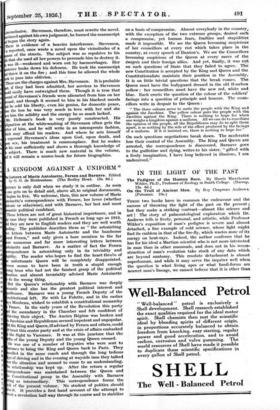A KINGDOM AGAINST A UNIFORM"
e Letters of Marie Antoinette, Fersen and Barnave. Edited by 0. G. de Heidenstam. (The Bodley Head. 12s. lid.) STORY is only dull when we study it in outline. As soon one gets on to detail and, aboVe all,te original .documents, begins to live. We welcome, then, this new volume of Marie oinette's correipondenee with Fersen, her lover (whether tonic or otherwise), and with Barnave, her last and most mantic political cenfidant.
These letters are not of great historical importance, and in y ease they Were published in French as long ago as 1913. they are new to English readers and they are well worth ding. The publisher describes them as "the astonishing N C letters between Marie Antoinette and the handsome tint Fersen," and only gives a bare mention to the far numerous and far more interesting letters between toinette and Barnave. As a matter of fact the Fersen rrespondence is astonishing only in its triviality and .gidity. The reader who hopes to find the heart throbs of e unfortunate Queen will be completely disappointed. rsen seems to have been in truth a stupid enough wig beau who had not the faintest grasp of the political nation and almost invariably advised Marie Antoinette do the wrong thing.
But the Queen's relationship with Barnave was deeply mantic and also has the greatest political interest and &mice. Barnave was a young French Deputy of the nstitutional left. He with La Folette, and in the earlier Ys Mirabeau, Wished to establish a constitutional monarchy France. In the early years of the Revolution this party d the ascendancy in the Chamber and felt confident of hieving their object. The Ancien Regime was broken and Jacobins and Republicans seemed impotent and unpopular. the King and Queen, ill advised by Fersen and others, could t trust this centre party and at the crisis of affairs embarked the flight to Varennes. It was at this juncture that the ths of the young Deputy and the young Queen crossed. lie was one of a number of Deputies who were sent to rennes to bring the King and Queen back to Paris. They 'elled in the same coach and through the long tedious Ys of driving and in the evening at wayside inns they talked er the situation and seemed to come to an understanding. relationship was kept up. After the return a regular ondence was maintained between the Queen and Constitutional group in the Assembly with Barnave leg as intermediary. This correspondence forms the lk of the present volume. No student of politics should ss it. It provides a first hand account of the attempt to est a revolution half-way through its course and to stabilize on a basis of compromise. Almost everybody in the country; with the exception of the two extreme groups, desired such a compromise, yet human fears, frailties and stupidities. made it impossible. We see the Queen becoming suspicious of her councillors at every riot which takes place in the country, at every speech of Danton's. We see the Councillors becoming suspicious of the Queen at every move of the emigres and their. foreign'allies. And yet, finally, it was not on such questions of State that they failed to agree. The new Constitution is accepted by the King and Queen and the Constitutionalists maintain their position in the Assembly. It is on little trivial questions that the break 'conies. '.1":h Queen must have the bodyguard dressed in the old Bourbon yellow : her councillors must have the new red, white and blue. Each erects the question of the colour of the soldiers! facings into a question of principle and honour. The coun- cillors write in despair to the Queen : "The three colours serve to unite the people with the King and against the Jacobins: The yellow colour puts the people with the Jacobins against the King. There is nothing to hope for when one weighs a kingdom against a Uniform. All we can do to conciliate the opinion Of the people, all time Republicans may do to split thein apart, is 89 nothing by the side of the effect produced by the facings of a uniform. If it is insisted on, there is nothing to hope for."
On such questions negotiations break down. The moderates lose their control of the A.ssembly. The King and Queen are arrested, the correspondence is discovered, Barnave goes to the guillotine and dying, writes to his-sister, " gifted with a lively imagination, I have long believed in illusions, I ant undeceived."














































 Previous page
Previous page